Choosing to Study Post-Compulsory Modern Foreign Languages in England: Motivations, Sociolinguistic Trends and the Context of BAME
Abstract
Annual Language Trends reports (2004- present) note that uptake of the school subject, Modern Foreign Languages (MFL), is in decline in England. These reports stem from the Department of Education’s 2004 decision to suspend compulsory MFL pedagogy in English schools at 14 years old. While previous research has focussed exclusively on motivational factors behind choosing to (dis)continue post-compulsory MFL study, this paper investigates any trends or divergences of these motivational factors in relation to extralinguistic factors, namely gender, type of school, socio-economic background, region and ethnicity. Drawing on empirical evidence from an online questionnaire of 319 recent school leavers, this study finds that: (i) MFL uptake is in particular decline at post-16; (ii) (female) students with higher social, cultural and economic capitals, originating from southern regions in England, are the group most likely to continue with post-compulsory MFL; (iii) it is external factors, such as the perceived difficulty of MFL by students and the supposed ‘boring’ curricula, rather than negative perceptions towards language learning, which are leading deterrents of post-compulsory MFL education; and (iv) when analysing ethnicity as an extralinguistic factor in isolation, the perceived ‘Eurocentric’ nature of the subject, in conjunction with the (lack of) provision of certain Heritage Languages, remain salient motivational uptake factors for students who identified as part of the Black, Asian, and Minority Ethnic community. Therefore, this paper has implications for amendments to educational policies, to build an exciting curriculum and learning environment based on students’ preferences and ameliorate uptake of postcompulsory MFL in England.

Published
Issue
Volume 2 (Issue 1)DOI
Permalink
- This work is licensed under a Creative Commons Attribution 4.0 International License.
